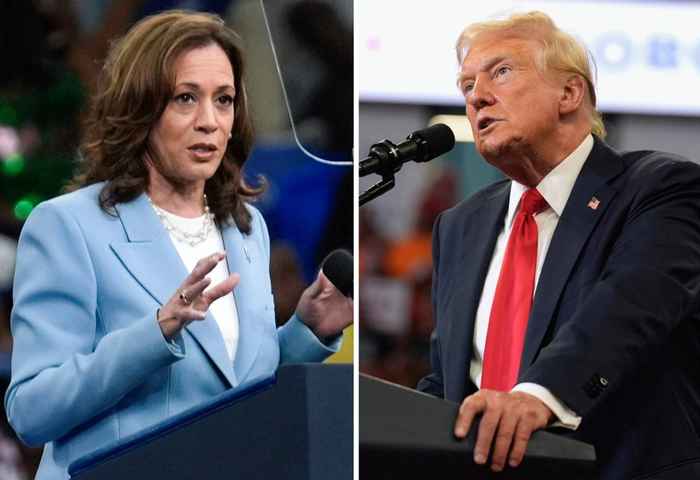Choosing America’s Future: Swing States, Election Issues, and the Trump-Harris Divide
31 October 2024

Anyone reading about the U.S. election will come across the word “historic” frequently. The media gives the impression that, more than ever, this election will have a major impact on America's future. 'I think what makes this year so special is the contrast between the two presidential candidates,' explains Hull. 'On the Republican side, Donald Trump has broken many democratic norms. For instance, he refused to accept the results of the free and fair elections that were held in November 2020. He has also openly spoken about using the presidency and the military against his political opponents. Kamala Harris, throughout her career—as Attorney General in California, then as a member of the Senate, and now as Vice President—supports basic democratic principles, such as the rule of law, democratic control of armed forces, and the peaceful transition of power.'
In addition to their different stances on democratic norms, Hull points out another major difference between the two candidates: their approach to issues of identity. 'Trump, with his incendiary remarks about immigrants and his derogatory comments about many women, particularly women of color (including Harris), aims to make race and gender central issues in the campaign. Trump appears to have calculated that xenophobia, misogyny, and misogynoir, misogyny specifically directed at women of color, will galvanize his base. Harris, however, has steadfastly refused to make her campaign about her own race and gender, despite the historic nature of her candidacy as a woman of color.'
Key Issues
Despite their differences, both candidates share an interest in convincing voters that they are the right leader for the next four years. As in previous elections, the economy is a major issue. 'Post-COVID inflation has resulted in both real and perceived increases in the cost of living for many Americans. Even if inflation has slowed recently, many Americans feel worse off now than they did during the Trump presidency.'
Donald Trump also seems to be calculating that continued immigration from Central America and security issues on the southern border are key concerns for voters. 'But the polls tend to suggest that, for most voters, immigration is not as big an issue as the economy.'
Another important issue in this election is women’s reproductive rights. Hull expects this will mobilize voters, especially women. 'In Dobbs v. Jackson in June 2022, the Supreme Court ruled that the Constitution did not guarantee women’s right to abortion. In several states, this decision led to reversals of the right to abortion at the state level. Now, there are ballot initiatives in many states, such as Arizona, Missouri, and Florida, that would guarantee some abortion rights. There is evidence to suggest that these ballot measures, in addition to (or even more than) the presidential election, will draw some voters to the polls.'
Swing States and Swing Voters
Since Trump and Harris are so close in the polls, swing states will be critical to the election outcome. Hull has no doubt about which state will be most important. 'Pennsylvania. Pennsylvania. Pennsylvania,' she states. 'Other than Pennsylvania, Michigan, Wisconsin, North Carolina, Georgia, Arizona, and Nevada are all important states to watch. Ohio and Florida, which used to be swing states, are now solidly Republican. I also hear talk of Texas being a swing state in the future, but not this year.'
In addition to performing well in swing states, both Harris and Trump hope to win over specific voter groups that can be decisive in elections. 'In 2016 and 2020, there was a lot of focus on the non-college-educated white male vote as key to electoral success. This was a group Trump did particularly well with in 2016, and which Biden won back to some extent in 2020. This year, there’s talk about Black and Latino male voters without college degrees as the group to watch, since a small but significant proportion of these men seem to be backing Trump (which is a change from the status quo in 2016 and 2020). However, Black and Latino men are also classified as ‘low-propensity voters,’ so it’s uncertain whether their growing support for Trump will translate into a significant increase in votes for him on election day.'
Discontinuity
It’s still uncertain who will become the 47th president, but the final outcome will undoubtedly have a major impact on how the United States positions itself internationally. 'I would predict a lot of continuity if Harris were to become president. I don’t get the impression that foreign policy is her driving passion, which in itself suggests continuity with Biden’s positions. I wouldn’t expect Harris to interfere in the day-to-day work of the Departments of State, Defense, and USAID. Her support for NATO and Ukraine will remain strong, as will her support for Israel—an issue that is largely ingrained in American politics, regardless of which party is in power.'
Trump, however, signals a lot of discontinuity with Biden’s approach, despite some alignment on withdrawing U.S. troops from Afghanistan. 'Trump has suggested that he would reignite an active trade war with China. He has also stated that he would put significant pressure on Ukraine to make major concessions to Russia to bring the most active phases of the war to an end. He has repeatedly threatened to reduce U.S. contributions to NATO. Trump takes an isolationist stance on American commitments abroad while simultaneously adopting inflammatory rhetoric about ‘America First.’ It’s a notably disruptive combination.'